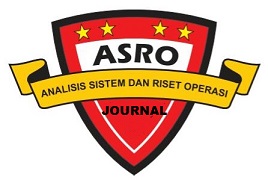SUPPLIER SELECTION AND ORDER QUANTITY ALLOCATION OF RAW MATERIAL USING INTEGER LINEAR PROGRAMMING
Abstract
ABSTRACT
The production activities of a company are influenced by sufficient availability of raw materials. The availability of raw materials will be fulfilled if the supplier regularly sends raw materials in accordance with the planned delivery time. However, each supplier has different capabilities in terms of supply capacity, price, product quality, and delivery time. Determining the right supplier will help the company maintain its production process. This study aims to identify which suppliers are selected to fulfill the demand for each production period and determine allocation of raw material orders to each selected supplier. The model developed to determine selected suppliers have been an integer linear programming. The model has the objective function of minimizing the total cost which consists of purchasing, ordering and holding costs. The constraints include supplier capacity, order quantity allocation, demand, inventory balance, safety stock, timely delivery, non negative and binary. Calculation results in giving a numerical example shows that the developed model is able to select suppliers per period. The model is also able to determine the allocation of raw material orders to selected suppliers. Sensitivity analysis is done to find out which parameters are sensitive. The results of the sensitivity analysis indicate that the parameters of supplier capacity and demand are sensitive parameters.
Keywords: Supplier selection, order quantity allocation, integer linear programming







